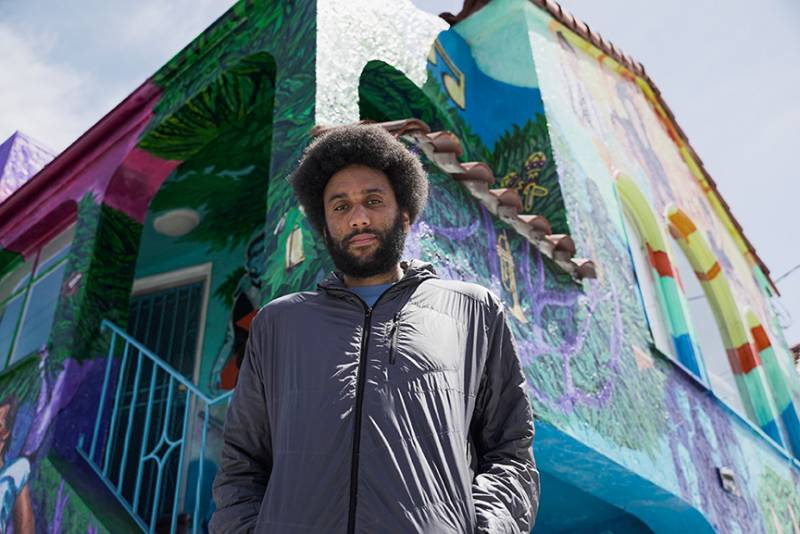Tongo Eisen-Martin, San Francisco’s eighth poet laureate, says it’s not enough to simply be a poet.
“The poet needs to just come on down to the trenches,” he says. Eisen-Martin’s suggestion for writers out there is to get involved in the community, whether that’s passing out flyers or organizing a mutual aid program. “That experience is what you synthesize good revolutionary poetry from.”
As a lifelong San Franciscan, Eisen-Martin has developed a unique perspective on how racism manifests in a liberal bastion like the Bay Area. In this episode, he addresses American militarism, state-sanctioned violence, and mass incarceration– as well as what can be done about these issues.
Eisen-Martin joined me for a brief but powerful interview that includes a performance of his poem, “A Sketch of Genocide.” The piece was included in his book, Heaven Is All Goodbyes, which won a 2018 American Book Award.
A Sketch about Genocide
A police chief says, “Yes, you poets make points. But they are all silly,”
Police chief sowing a mouth onto a mouth
Police chief looking straight through the poet
Flesh market both sides of the levy
Change of plans both sides of the nonviolence
On no earth
Just an earth character
His subordinate says, “Awkward basketball moves look good on you, sir… Yes, we are everywhere, sir… yes, unfortunately for now, white people only have Black History … we will slide the wallpaper right into their cereal bowls, sir … Surveil the shuffle.”
I am a beggar and all of this day is too easy
I want to see all of the phases of a wall
Every age it goes through
Its humanity
Its environmental racism
We call this the ordeal blues
Now crawl to the piano seat and make a blanket for your cell
Paint scenes of a child dancing up to the court appearance
And leaving a man,
but not for home
Atlantic ocean charts mixed in with parole papers
Mainstream funding (the ruling class’s only pacifism)
Ruling class printing judges (fiat kangaroos)
Making judges hand over fist
Rapture cop packs and opposition whites all above a thorny stem
Caste plans picked out like vans for the murder show anglo‐saints addicting you to a power structure
you want me to raise a little slave, don’t you?
bash his little brain in
and send him to your civil rights
No pain
Just a white pain
Delicate bullets in a box next to a stack of monolith scriptures
(makes these bullets look relevant, don’t it?)
I remember you
Everywhere you lay your hat is the capital of the south
The posture you introduced to that fence
The fence you introduced to political theory
If you shred my dreams, son
I will tack you to gun smoke
The suburbs are finally offended
this will be a meditation too
Below are lightly edited excerpts of my conversation with poet Tongo Eisen-Martin:
TONGO: I feel like the primary generator of reality in the United States is military reality. It’s the organizations of violence or the monopolies of violence especially, wielded by the state. And a state wielded by a ruling class. Prison is evidence of this principle. To be clear, you are living in a reality of organized violence. Along with the blood comes the culture of just, confined, compartmentalized living. I don’t see how any of us walk around having normal days when the kids are still in cages. When you think about the individual adventure you’re on. How lovingly can I pat myself on the back when there’s some severe injustice going on.
PEN: What can you do about that injustice as a poet?
TONGO: The poet needs to just come on down to the trenches, come on down to whatever political efforts are already going on. Do not be sad if nobody wants to hear a poem down there, ya know.
PEN: [laughs]
TONGO: That’s primary. That experience is what you synthesize good revolutionary poetry from.
This is the first in a series of shorter shows we’re doing this year, called “Pocket Poems Podcasts.” All of these Rightnowish episodes feature poets performing their work. Enjoy!
Catch up on our music series with this Spotify playlist:

Rightnowish is an arts and culture podcast produced at KQED. Listen to it wherever you get your podcasts or click the play button at the top of this page and subscribe to the show on NPR One, Spotify, Apple Podcasts, TuneIn, Stitcher or wherever you get your podcasts.


